One of the major findings of Pew Research’s 2006 survey of Hispanics and religion was the strong influence of Pentecostalism and other spirit-filled forms of Christianity. These lively, highly personal faiths emphasize the spiritually renewing “gifts of the Holy Spirit,” such as speaking in tongues, divine healing and direct revelations from God. Together, these religious traditions are sometimes referred to as the “renewalist” branch of Christianity.
Renewalist Christianity, which was one of the fastest-growing movements in global Christianity during the 20th century, continues to have a strong presence in the U.S. Hispanic community. Two-thirds of Latino Protestants and about half of Latino Catholics can be classified as renewalist Christians.
Renewalist Christians, whether Protestant or Catholic, tend to be more religiously committed than their non-renewalist counterparts. And while charismatic Catholics resemble renewalist Protestants in some ways, they hold just as strongly as other Catholics – if not more so – to some traditional Catholic beliefs and practices.
Trends reported in this chapter come from the 2006 Pew Research Center survey of Hispanics and religion and a subsequent call-back survey of Hispanic Catholics conducted in 2007. See Appendix A: Survey Methodology for more detail.
Most Latino Protestants, Half of Latino Catholics are Renewalists
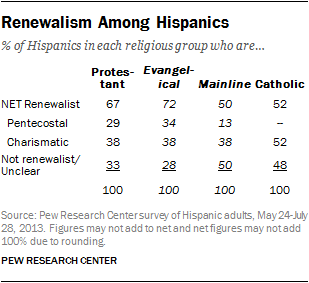
Two-thirds of Hispanic Protestants (67%) and about half of Hispanic Catholics (52%) can be classified as renewalists.21
The new survey finds that about three-in-ten (29%) Latino Protestants belong to traditional Pentecostal denominations, such as the Assemblies of God or the Assembly of Christian Churches. An additional 38% describe themselves as Pentecostal or charismatic Christians even though they do not belong to a Pentecostal denomination.
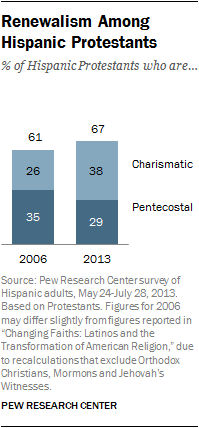
Among Latino Protestants, the share that fall into the renewalist category has grown since 2006, from 61% to 67%. The percentage of Latino Protestants who belong to a Pentecostal denomination has declined somewhat, from 35% in 2006 to 29% in 2013, but the percentage of charismatic Protestants has increased by 12 percentage points, from 26% in 2006 to 38% in 2013.
The share of Hispanic Catholics who can be classified as renewalists has remained steady, with 52% saying they are either charismatic or Pentecostal Catholics, compared with 54% in 2006.
Renewalist Practices and Worship Experience
Protestants
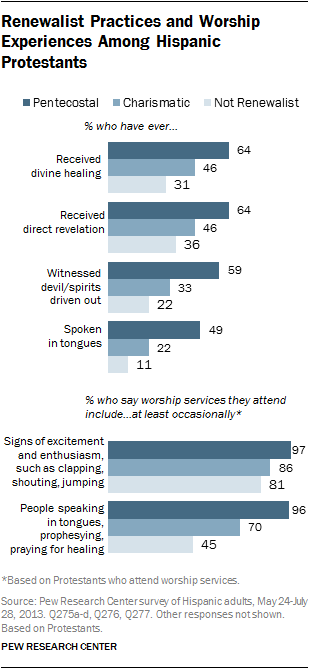
Renewalist practices — such as receiving divine healings or direct revelations, witnessing the devil or evil spirits being driven out of a person, or speaking or praying in tongues — are particularly common among Pentecostal Protestants. Roughly two-thirds of Latino Pentecostals say they have received a divine healing of an illness or injury (64%) or a direct revelation from God (64%). About six-in-ten say they have witnessed an exorcism (59%) and about half say they have spoken or prayed in tongues (49%).
Latino charismatic Protestants are less likely than Pentecostals but more likely than non-renewalist Protestants to have had these experiences. Among charismatic Protestants, 46% say they have experienced a divine healing and the same share say they have received a direct revelation from God. One-third have witnessed the devil or evil spirits being driven out of someone (33%), and about a fifth (22%) have spoken or prayed in tongues. Fewer non-renewalist Protestants report any of these experiences.
Among Latino Pentecostal Protestants who attend worship services, the vast majority (97%) say the services they attend include people displaying signs of excitement and enthusiasm – such as raising their hands in praise, clapping, shouting or jumping – at least occasionally. More than half (57%) say such signs of excitement and enthusiasm are always present at their worship services. Smaller, though still substantial, majorities of churchgoing charismatic Protestants (86%) and non-renewalist Protestants (81%) also witness such displays at least occasionally during services.
Nearly all churchgoing Pentecostals (96%) also say that the worship services they attend include people speaking in tongues, “prophesying or receiving a word of knowledge” or praying for miraculous healings and deliverance, at least occasionally. Among charismatic Protestants who attend worship services, seven-in-ten observe such practices. By contrast, about half of non-renewalist Protestant churchgoers (53%) say they never observe these practices at worship services.
In this report, the term “Pentecostal” is used to describe those who belong to Pentecostal denominations, such as the Assemblies of God or the Assembly of Christian Churches.
The term “charismatic” is used to describe Christians, including Protestants and Catholics, who do not belong to Pentecostal denominations but who nevertheless describe themselves as either charismatic or Pentecostal Christians.
“Renewalist” is an umbrella term that refers to both Pentecostals and charismatics as a group.
This chapter focuses exclusively on Protestants and Catholics. While some other Christians, such as Orthodox Christians and Jehovah’s Witnesses, might describe themselves as either charismatic or Pentecostal, sample sizes in this survey do not allow for separate analyses of these groups.
Throughout the rest of this report, Protestants are categorized as either evangelical or mainline Protestants. There is significant overlap between these groups and the renewalist groups discussed in this chapter. Among Pentecostal Protestants, for example, about nine-in-ten (89%) also identify as evangelical. And among charismatic Protestants, three-quarters also identify as evangelical Protestants.
Catholics
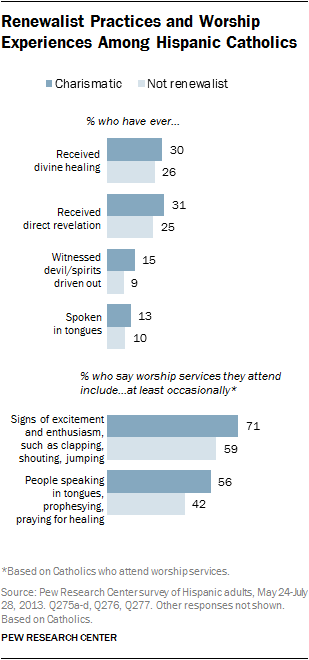
While Catholics are less likely than Protestants to have these renewalist experiences, charismatic Catholics report experiencing some of these things at slightly higher rates than non-renewalist Catholics.
For instance, higher percentages of charismatic Catholics than non-renewalist Catholics say they have received a direct revelation from God (31% of charismatics vs. 25% of non-renewalists) and have witnessed the devil or evil spirits being driven out of a person (15% vs. 9%). And among Latino Catholics who attend Mass, a higher percentage of charismatics than non-renewalists say that the worship services they attend include people displaying signs of excitement and enthusiasm, such as clapping or jumping, at least occasionally (71% vs. 59%). A larger share of churchgoing charismatic Catholics than non-renewalists also say the services they attend include speaking in tongues, prophesying or praying for deliverance or healing (56% vs. 42%).
Religious Commitment and Involvement
Hispanic renewalists stand out as having higher levels of religious commitment than their non-renewalist counterparts on measures such as frequency of church attendance, importance of religion in their lives and frequency of prayer. Hispanic renewalists also tend to report more involvement in religious practices outside of worship services than do non-renewalists, and they are more likely to hold a leadership position in their place of worship. (For additional analysis of these religious practices, see Chapter 3.)
Protestants
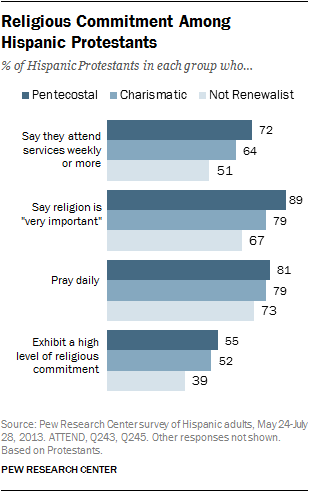
Latino Pentecostal and charismatic Protestants are more likely than non-renewalist Protestants to say they attend worship services at least once a week (72% of Pentecostals, 64% of charismatics and 51% of non-renewalist Protestants) and to say that religion is very important in their lives (89% of Pentecostals, 79% of charismatics and 67% of non-renewalist Protestants). Large majorities of Latino Protestants say they pray at least once a day, whether they are Pentecostal (81%), charismatic (79%) or non-renewalist Protestants (73%). On an index that incorporates these three measures of religious commitment, about half of Pentecostal (55%) and charismatic Protestants (52%) are in the “high commitment” category, compared with 39% of non-renewalist Protestants. (See Chapter 3 for more on the index.)
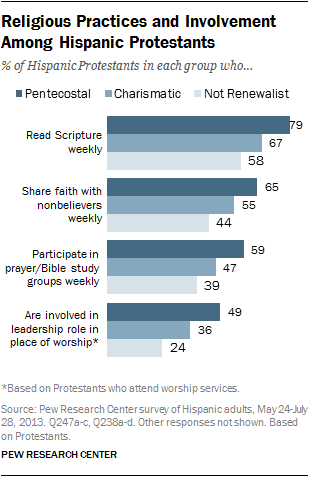
Hispanic renewalist Protestants, particularly Pentecostals, are highly involved in religious practices outside of worship services, such as Bible study and sharing their faith with others. Majorities of Pentecostal Protestants say they read Scripture outside of worship services at least once a week (79%), share their faith with nonbelievers at least once a week (65%) and participate in prayer groups or Bible study groups at least once a week (59%). Somewhat smaller shares of charismatic Protestants are involved in each of these practices: 67% say they read Scripture at least weekly, 55% share their faith with nonbelievers at least weekly and 47% participate in prayer groups or Bible studies. While a majority of non-renewalist Protestants say they read Scripture at least once a week (58%), fewer share their faith with nonbelievers (44%) or participate in prayer or Bible study groups (39%) with the same frequency.
About half of churchgoing Latino Pentecostals (49%) are involved in some kind of leadership role in their church, such as serving as a lay minister, a member of the church council, a leader of a small group or ministry or a Sunday school or religious education teacher. By comparison, 36% of charismatic Protestants and about a quarter of non-renewalist Protestant churchgoers (24%) hold such a role in their place of worship.
Catholics
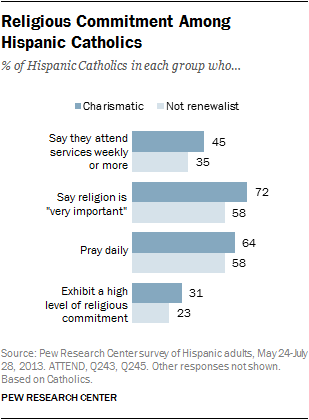
Charismatic Catholics also tend to show somewhat higher levels of commitment and church involvement than Catholics who are not classified as renewalists. About seven-in-ten charismatic Catholics (72%) say religion is very important in their lives and roughly two-thirds (64%) say they pray at least once a day, compared with 58% of other Catholics who say each of these things. Charismatic Catholics also are more likely than other Catholics to say they attend Mass at least once a week (45% vs. 35%).
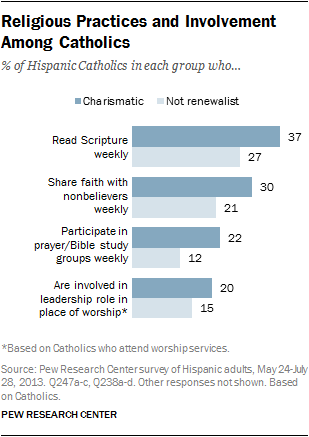
Similarly, charismatic Catholics are more likely than non-renewalist Catholics to engage regularly in religious practices outside of worship services, such as reading Scripture at least once a week (37% of charismatic Catholics vs. 27% of non-renewalist Catholics), sharing their faith with nonbelievers at least once a week (30% vs. 21%) or attending a prayer group or Bible study group weekly (22% vs. 12%). Additionally, charismatic Catholics who attend worship services are slightly more likely than other churchgoing Catholics to hold a leadership role in their parish, such as serving as a Eucharistic minister or religious education teacher (20% vs. 15%).
Renewalism and Beliefs About the Bible, Return of Jesus Christ
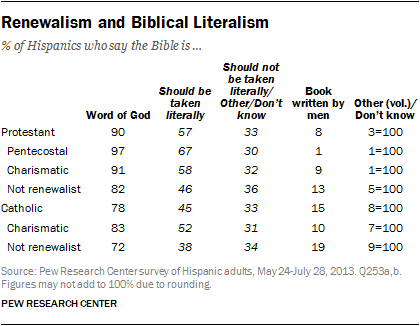
Nearly all Hispanic Pentecostal Protestants (97%) believe that the Bible is the word of God, and about two-thirds (67%) say it should be taken literally, word for word. Fewer non-renewalist Protestants (46%) say the Bible should be taken literally.
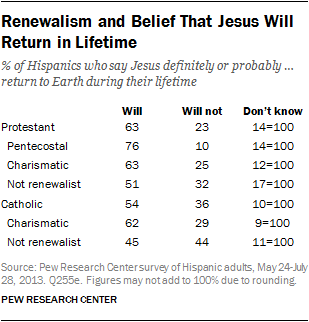
Latino Pentecostal Protestants also are particularly likely to hold the belief that Jesus Christ will return to Earth during their lifetime – 76% believe this, including half who say it will definitely happen in their lifetime and about a quarter (26%) who say it will probably happen. A majority of charismatic Protestants (63%) also believe Jesus will definitely or probably return in their lifetime, while fewer non-renewalist Protestants – about half (51%) – hold this belief.
Hispanic charismatic Catholics are more likely than non-renewalist Catholics to take a literalist view of the Bible (52% vs. 38%). They also are more likely to believe that Jesus Christ will either definitely or probably return during their lifetime (62% vs. 45%).
(For more on these beliefs, see Chapter 6.)
The Prosperity Gospel, Curing Social Ills
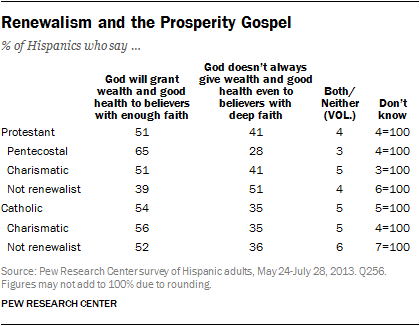
Hispanic Pentecostal Protestants also are more likely than other Protestants to believe in what is often referred to as the “prosperity gospel” – that God will grant wealth and good health to all believers who have enough faith. About two-thirds of Pentecostal Protestants (65%) believe this, compared with about half (51%) of charismatic Protestants and 39% of non-renewalist Protestants.

About two-thirds of Latino Pentecostal Protestants (68%) also believe that if enough people were brought to Christ, social ills would take care of themselves. A similar share of charismatic Protestants (62%) hold this belief, as do 55% of non-renewalist Protestants.
Hispanic charismatic Catholics are more likely than other Catholics to believe that bringing people to Christ will solve social ills (63% vs. 56%). However, charismatic Catholics and non-renewalist Catholics are about equally likely to believe in the prosperity gospel. About half or more in each group agree that God will grant wealth and good health to believers who have enough faith (56% of charismatic Catholics vs. 52% of non-renewalist Catholics).
(For more on these beliefs, see Chapter 6.)
Renewalism and Traditional Catholic Beliefs and Practices
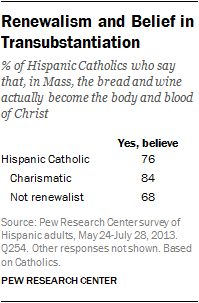
While charismatic Catholics are more likely than non-renewalist Catholics to hold beliefs and engage in practices that are generally associated with the Pentecostal tradition, there is no evidence to suggest that charismatic Catholics are “less Catholic” in their beliefs and practices. In fact, charismatic Catholics are as likely as — and in some cases even more likely than — other Catholics to adhere to traditionally Catholic beliefs and practices.
A majority of Catholics (76%) believe that in Mass, the bread and wine actually become the body and blood of Christ; charismatic Catholics (84%) are even more likely than non-renewalist Catholics (68%) to believe in transubstantiation.

Charismatic Catholics also are more likely than other Catholics to say they go to confession with a priest at least a few times a year (49% vs. 35%), though about half or more in each group say they seldom or never go.
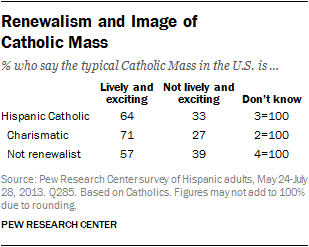
Larger shares of charismatic Catholics than non-renewalist Catholics say that they pray to the Virgin Mary (86% vs. 77%) and that they pray to saints for help when they face difficult moments in their lives (75% vs. 65%).
And more charismatic Catholics than other Catholics say the typical Catholic Mass in the U.S. is lively and exciting – 71% of charismatic Catholics say this, as do 57% of other Catholics.
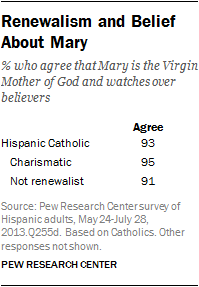
On some other Catholic beliefs and practices, Latino charismatic Catholics closely resemble Latino Catholics who are not renewalists. For instance, upwards of eight-in-ten Catholics, both charismatic and not, say they have a crucifix or other religious objects displayed in their home. And the vast majority of Catholics, including upwards of nine-in-ten of both charismatic Catholics (95%) and others (91%), agree with the statement “Mary is the Virgin Mother of God and watches over believers.”
Interfaith Worship Attendance
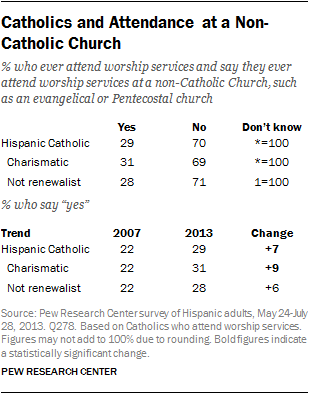
While charismatic Catholics report many renewalist elements in their worship services and religious practices, relatively few say they ever attend services at a non-Catholic church, such as an evangelical or Pentecostal church. About three-in-ten charismatic Catholics who attend worship services (31%) say that they ever attend services at a non-Catholic church, and a similar share of non-charismatic Catholics (28%) say the same. The share of charismatic Catholics who ever attend non-Catholic services has risen nine percentage points since 2007.
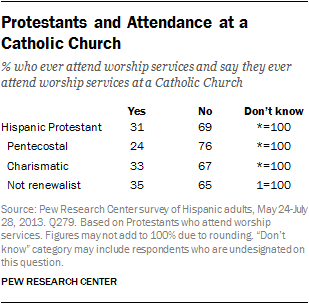
Among churchgoing Protestants, a similar share (31%) report that they ever attend Catholic services. Pentecostal Protestants are less likely than non-renewalist Protestants to ever attend Catholic services (24% vs. 35%).
In 2007, this question was only asked of Catholics, so there is no comparison over time for Protestants.
The Demographics of Hispanic Renewalists
Hispanic renewalist Christians are more heavily foreign born than non-renewalists, and tend to have lower levels of educational attainment. There are few differences, however, between renewalists and others when it comes to gender and age.
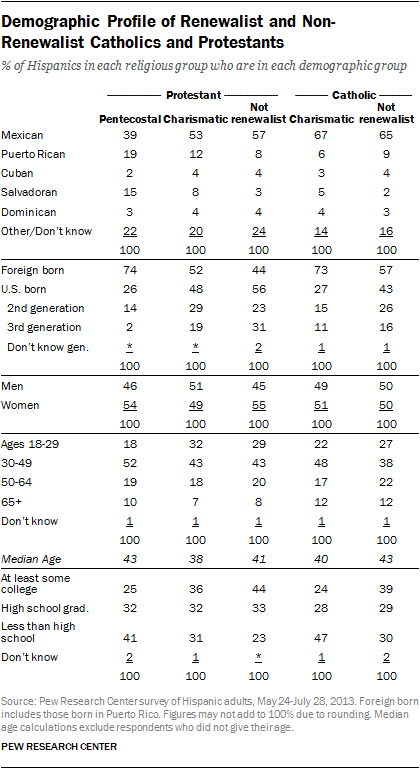
Protestants
Nearly three-quarters of Hispanic Pentecostal Protestants (74%) are foreign born, as are about half of charismatic Protestants (52%). Among non-renewalist Protestants, 56% are U.S. born and 44% are foreign born.
Latino Pentecostal Protestants tend to have lower levels of educational attainment than non-renewalist Latino Protestants. Among Pentecostals, 41% have less than a high school degree, while 44% of non-renewalist Protestants have some college education or more. Educational attainment and nativity are often correlated, but even among just the foreign born, Pentecostal Protestants are more likely than non-renewalists to have less than a high school degree (49% vs. 31%) and less likely to have more than a high school degree (15% vs. 37%).
While a plurality of Latino Pentecostal Protestants are of Mexican origin (39%), Pentecostals are less likely to be of Mexican descent than are charismatic Protestants (53%) and non-renewalist Protestants (57%). By contrast, Pentecostals are somewhat more likely than charismatic Protestants and non-renewalist Protestants to be of Puerto Rican or Salvadoran origin. Roughly one-in-five Pentecostal Protestants (19%) are Puerto Rican and 15% are Salvadoran, compared with 12% and 8% of charismatics, respectively, and 8% and 3% of non-renewalists.
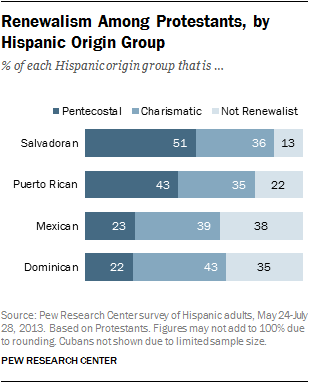
The degree of renewalism among Hispanic Protestants also varies somewhat by Hispanic origin group. Among Protestants of Salvadoran origin, a majority are renewalists; about half are Pentecostals (51%) and roughly a third are charismatic Protestants (36%). And about four-in-five Protestants of Puerto Rican origin are renewalists, including 43% who are Pentecostal and 35% who are charismatic Protestants. Smaller majorities of Mexican and Dominican Protestants are renewalists, with about a fifth in each group belonging to Pentecostal denominations (23% and 22%, respectively). There are too few Protestants of Cuban origin in the survey sample to analyze this group separately.
Catholics
Nearly three-quarters of Latino charismatic Catholics (73%) are foreign born, compared with 57% of other Latino Catholics. There are no significant differences, however, between charismatic Catholics and other Catholics when it comes to origin groups. Roughly two-thirds of both charismatic Catholics (67%) and other Catholics (65%) are of Mexican origin.
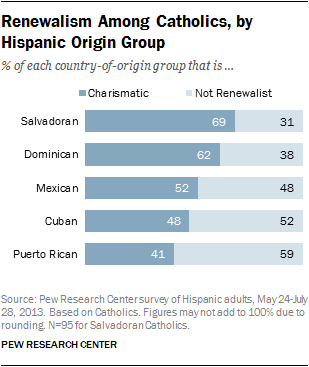
As with Latino Protestants, Latino charismatic Catholics tend to have lower levels of educational attainment than Latino Catholics who are not renewalists. About a quarter of charismatic Catholics (24%) have some education beyond high school, while 47% have less than a high school degree. Among non-renewalist Catholics, about four-in-ten (39%) have more than a high school degree and three-in-ten have less than a high school degree.
The presence of renewalism among Hispanic Catholics varies somewhat by Hispanic origin group. Nearly seven-in-ten Catholics of Salvadoran origin (69%) are charismatic Catholics, as are about six-in-ten Catholics of Dominican origin (62%). Roughly half of Catholics of Mexican (52%) and Cuban (48%) origin are charismatic Catholics. By contrast, a majority of Catholics of Puerto Rican origin (59%) are not renewalists.




